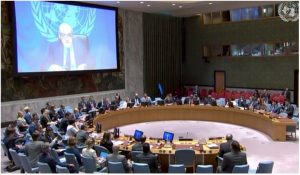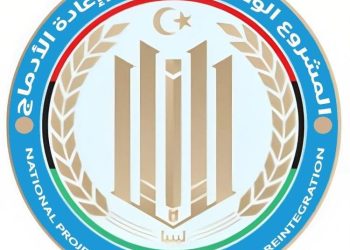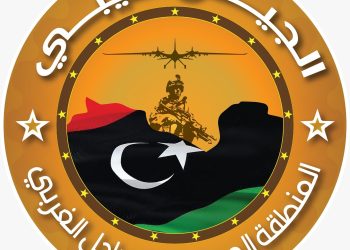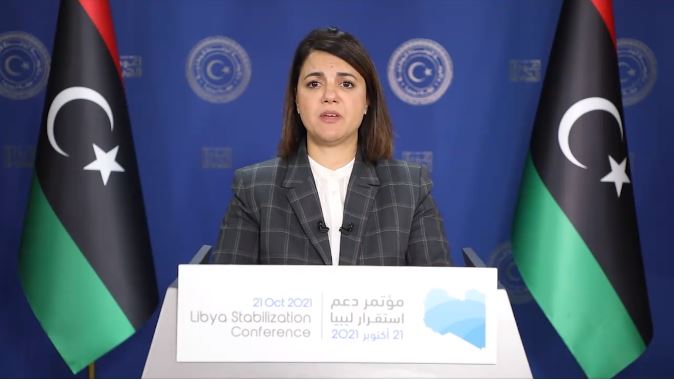By Sami Zaptia.

Frankfurt, 6 September 2018:
Ghassan Salame, SRSG and UNSMIL head, talked tough yesterday during his latest Libya
brief to the UN Security Council. Using language and frankness not heard from him before, he called out Libya’s militias, HoR and HSC members.
Salame admitted that what has existed in Tripoli was merely a ‘‘façade of calm’’ and that the capital ‘‘stood on brink of all-out war’’. He said that UNSMIL will not allow the militias to repeat their 2014 military actions against the capital nor will it allow a return to the militia/security ‘‘status quo ante’’. He also admitted that Libya has been lurching from ‘‘one emergency to another’’.
The UNSMIL head also admitted that the ‘‘previous arrangements empowered’’ militias. However, he felt that the latest militia crisis may offer an opportunity to tackle the ‘‘real causes’’ of the latest militia fighting and to ‘‘reduce the influence of armed groups’’ that have been legitimized, and enshrined and appeased by the Libyan political process since 2011.
He warned that ISIL presence and operations in Libya were spreading and called for the urgent implementation of the Libya’s promised economic reforms.
But Salame saved his strongest remarks for the House of Representatives (HoR) and High State (HSC) Council. He said that the HoR was resisting change and failing to do its job, and together with the HSC, were attempting to ‘‘ensure their longevity’’. He warned, however, that Libya’s political elite could be by-passed in the political process.
He also took a swipe at the international community, widely considered to be France and Italy, for their politicking and called on them to unify their positions on Libya.
Here is his whole report:
Mr President,
I would like to congratulate the United States of America on its presidency of the Council this month and thank you for this opportunity to update the Council.
Mr President, Members of the Council
In each and every briefing I have given to this Council, I have stated that the status quo in Libya is untenable.
The violence that consumed the Capital beginning 26 August shattered the façade of calm that had prevailed in Tripoli since May 2017.
Tanks and heavy artillery were deployed into residential neighborhoods. 61 Libyans were killed and 159 injured. Many of those who died were civilians, including children. Families were forced to flee their homes. Looting and crime became common place as gangs took to the streets. Hundreds of criminals broke out of prison. Migrants were either trapped in detention centers, or turned onto the street.
The City stood on the brink of all-out war.
On 4 September, the Mission brokered a ceasefire between the major parties to the conflict. This has effectively halted the fighting and started the restoration of some order to the city.
The Mission is now working to protect this fragile peace and enable it to take root. As a first step, we are offering technical assistance and good offices in support of the ceasefire.
Groups that violate the ceasefire must be held to account. The United Nations and the international community are watching them one by one. The time for impunity is behind us.
We will not allow a repeat of 2014.
Mr President,
This outbreak of violence is but the latest in a series of crises that have engulfed Libya. The events surrounding the Oil Crescent region in June and July effectively threatened to split the country. In the past short weeks, the nation has lurched from one emergency to another.
On 10 August, armed groups forcibly evicted displaced Tawerghan families from the Tariq al-Matar IDP Camp. Some Tawerghans were killed and injured, homes were demolished and these Libyans were forced to flee, leaving them homeless for a second time in seven years. Despite the welcome return of several more families to Tawergha, totaling approximately 100 families at the end of August, basic infrastructure and services are still lacking, making a dignified return very difficult. We warned all armed groups against any repetition of this totally unlawful behavior. Forced displacement of people is unacceptable, and of those already displaced, doubly so. This was made clear to all those tempted by it.
After the horrendous attack on the High National Elections Commission of 2 May, on 23 August, ISIL claimed responsibility for an attack near Zliten, which claimed the lives of four police officers. ISIL presence and operations in Libya are only spreading. I alert this Council of the possibility that Libya may become a shelter for terrorist groups of all persuasions and ask the Council to help address with this looming threat.
In recent weeks, Chadian Government and Chadian opposition forces have been fighting, operating from Southern Libya. Over 1,000 fighters have been involved in the hostilities, risking the South becoming a regional battle ground and safe haven for foreign armed groups, including terrorist organizations. The recent Agreement signed between Chad, Sudan, Niger and Libya needs to be implemented so Libya does not also become an alternative battleground for others. The signatories have asked for support from the International Community for the implementation of these agreements, and I hope that Council members will positively consider their request.
In the Eastern city of Derna, sporadic clashes and air raids continue. The UN is facilitating humanitarian assistance to affected families in the city. I reiterate my call upon all parties to exercise restraint and protect the lives of innocent civilians.
Abuse and exploitation abound within prisons and detention centers, which we continue to have great difficulty accessing, both in the East and West. Refugees and asylum seekers in detention centres have resorted to hunger strikes as a means to resolve their bleak living circumstances.
This situation should however not be used as an excuse for any armed group to open the gates to terrorists and criminals interned in one location, to displace them to other locations.
All the while, the citizens of the country suffer deteriorating standards of living, as they have for the last years. Now, for many, every day is a personal emergency.
Mr President, Members of the Council
We must not return to the status quo ante.
In crisis, lies the opportunity to tackle the underlying causes.
To restore stability to Libya, there is an urgent need to establish strong and unified civilian and military institutions, which work for the benefit of all citizens.
The Mission is now focusing its work in two intertwined areas:
First, and in order to underpin the ceasefire, we are working to revise the security arrangements in Tripoli in order to reduce the influence of groups who use arms to achieve their parochial goals.
In the coming days UNSMIL will continue to hold broad consultations to strengthen the ceasefire and assist in the establishment of a monitoring mechanism. At the same time, we will continue to work with our Libyan counterparts to identify concrete steps towards reshaping security in the Capital and develop more sustainable arrangements.
UNSMIL will endeavour to facilitate this effort in an inclusive and pragmatic fashion, laying the foundations for longer term efforts to stabilize the country, through the reunification of the security sector institutions.
The previous security configuration empowered groups who acted in a predatory manner against the residents of the capital, against the state, and against sovereign institutions.
Indeed, members of some armed groups nominally acting under the Ministry of Interior have kidnapped, tortured and murdered employees of sovereign institutions, including the National Oil Corporation and the Libyan Investment Authority.
Our public criticism of the predatory behavior of armed groups in the capital was warmly welcomed by Libyans, who are fed up with living on the poverty line whilst their national resources are looted by gunmen-turned-millionaires. Our stand has produced a salutary impact in many cases. This state capture must end, but not to benefit of other armed groups, but to the full control of the legitimate authorities. Your support on this is crucial.
Mr President,
The Mission’s second priority is to address the economic issues which underpin the crisis and erode the daily lives of citizens across the country. I would like to state plainly that if an end is not put to the plundering, there is little chance that we can move either the economic reforms or the political process.
We urge action on the agreed upon economic reforms which are essential, and overdue. I call upon the Central Bank of Libya and the Government of National Accord to immediately move forward on currency exchange rate and subsidy reforms.
We are also committed to advocating for a more equitable distribution of wealth in Libya, focused not on appeasing groups based on their military strength, but on providing for citizens based on their need.
UNSMIL believes that the request from Prime Minister Fayez Serraj for international support for a financial review is a valuable opportunity to bring transparency and accountability to how the country’s wealth is managed.
In response to the Security Council’s request of 19 July to the Mission to provide suggestions on the modalities of such a review, I have been engaged with Libyan and international partners.
I convened the Governor of the internationally-recognised Central Bank of Libya in Tripoli and the head of the parallel Central Bank in the East for a meeting at the UNSMIL office to agree on the broad parameters of the review. On 24 August, the Secretary-General submitted to this Council my proposals for how to proceed.
This preliminary process has created hope, with many Libyans welcoming the meeting of the two officials, something that has not happened in the past four years. This was a first step towards unifying the Central Bank, which in turn is a crucial step towards unifying the country.
Mr President, Members of the Council,
When the political process grinds to a halt, some will believe there is opportunity to force change through the barrel of a gun.
The Libyan public has made a clear decision on how this change should come to pass – peacefully and democratically through elections. This was widely reflected during the National Conference consultations – a report on which is currently being prepared.
It should come as no surprise that the Libyans want change in their political leadership. The members of the House of Representatives were elected over four years ago by around fifteen percent of the population. The members of the High Council of State, which represents a fraction of the members of the General National Congress, were elected six years ago. The Government of National Accord assumed their roles not through elections, but by appointment, and many of them have been inactive for a long while.
For National elections to take place a number of conditions must be met. They will require great effort to achieve; but they are achievable. The United Nations is working hard to put these conditions in place, and thanks the international community for its support.
Time and time again, the House of Representatives has promised to produce referendum and election legislation. After three sessions dedicated to the referendum law, and numerous delays, the House of Representatives has failed to deliver this legislation. Those who have an interest in maintaining the status quo have spared no efforts to resist the needed change.
I will not mince words. Many members of the House of Representatives are failing to do their job. They seek to subvert the political process to their own ends, behind the guise of procedure. It is clear; they simply have no intention of relinquishing their positions. They have put in place legal provisions to maintain their authority in perpetuity.
And for the personal ambitions of a few, all Libya’s citizens have paid a steep price.
I welcome any rapprochement between the two Houses and take note of their recent meetings in Tripoli, but this activity must be directed to advance the political process, not to ensure their own longevity.
In line with instructions from the United Nations Secretary-General, I have been exhausting the traditional avenues to move the legislative process forward. So far, they have either been blocked or they are designed to lead nowhere.
If legislation is not produced soon, we will close the chapter on this approach. There are other ways to achieve peaceful political change, and we will embrace them with no hesitation, indeed with enthusiasm.
Mr President, Members of the Council
I am fully aware that the members of this Council are not mere spectators to the Libyans crisis, and want it over as soon as possible. Their unified, determined and vocal position is what the Libyans need to hear, if the citizens of this country are to enjoy the peace and tranquility they are desperately looking for.
Thank you.









